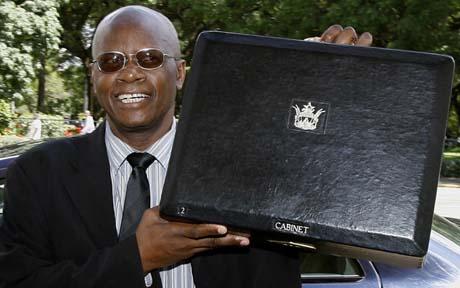


GOVERNMENT appears headed for a substantial budget deficit this year, with a Treasury report revealing a US$68 million financing deficit during the first quarter of this year. This emerged as the International Monetary Fund (IMF) warned in its Article IV Consultation on Zimbabwe released last week that fiscal pressure is unlikely to relent this year, after election-related spending and the public sector wage bill exacerbated expenditure overruns in 2013.
The IMF warned that budget targets this fiscal year were “in doubt in the context of sluggish growth and a 14 percent increase in the wage bill relative to 2013”. Commentators warned this was a precursor to painful times ahead. The Ministry of Finance revealed in its report for March that revenue collections during the first quarter totalled US$805,4 million, against targeted inflows of US$873,3 million, giving a negative variance of -8,4 percent.
“Cumulatively to March, total revenue collections amounted to US$805, 48 million against a target of US$873,3 million, ” said the Treasury State of the Economy Report. The below-target revenue inflows are likely to be worsened by expected expenditure overruns emanating from salary increases awarded to civil servants this year, which had not been budgeted for.
The Treasury report said: “Cumulative revenue collection to March for the year 2014 was 3,8 percent lower than what was collected during the same period in 2013.” In March, State revenues were US$3,6 million behind target. For a country battling to overcome company closures and high unemployment, a crumbling health system and a failing banking sector, the situation is worrying, considering that recourse to domestic funding is limited by a liquidity crunch in the economy, as well as lack of access to international funding by government due to outstanding arrears with offshore lenders.
The Treasury report said state revenues had significantly declined, retreating by 12,4 percent to US$236 million in February, from US$269,4 million at the same time last year. Inflows dropped to US$251,6 million in January 2014, from US$254 million in 2013, tracking a sharp drop in industrial output and a slide in disposable incomes among mostly jobless Zimbabweans.
The report, which exposed a serious fiscal crisis that has been compounded by reluctance by some State agencies to remit collections into Treasury, hinted of tough times ahead. Loans to government, which registered a 26 percent growth to US$415 million in February from US$327 million in January, outpaced the increase in private sector loans and advances, which climbed by 1,7 percent. This is bad news.
Government’s presence on the market crowds out productive sectors and places further pressure on the cost of money. University of Zimbabwe graduate school of management lecturer, Tony Hawkins, said the little available liquidity on the domestic market was being mopped up by the State, which was deploying it towards consumptive expenditures at the expensive of growth stimulating capital projects. “So much of the budget is going to wages,” said Hawkins.
“It is difficult to make savings.”
Government, which has previously ignored evidence of an economic crisis, is now admitting that the future is bleak, warning that the scourge of deflation, which had crept into the economy just after the country adopted a hard currency economy and ditched its own currency, was beginning to take a toll on the economy.
“Going forward, deflation will persist due to depressed aggregate demand, stable international oil and food prices, as well as appreciation of the country’s real effective exchange rate.
“The manufacturing sector remained under pressure, with a number of companies facing acute financing challenges. The liquidity constraints affecting the economy have resulted in weak demand, with consequences of decline in sales volumes. Average electricity generation capacity in March was 1 002,9 MW/h against a target of 1 023 MW/h,” the report said.
Domestic credit increased to US$4,1 billion in February, from US$3,9 billion in January, while bearish sentiment continued to dog the stock markets. Exports plunged by US$88 million to US$470,5 million during the first two months of the year, from US$558,6 million during the same period last year. Imports also dipped, although they still surpassed exports.
In an update to shareholders, Fidelity Life Assurance of Zimbabwe managing director, Simon Chapereka, painted a gloomy outlook for equities. “We don’t expect an improvement in terms of equities,” said Chapereka.
Across all sectors of the tottering economy, the trading environment has deteriorated, with nearly all companies struggling to stay afloat due to depressed demand.
Hawkins warned that revenues would continue to underperform as industries closed or downsised. “Results from companies have shown that volumes are going down. It appears revenues will continue to underperform. It reflects the economic slowdown,” said Hawkins. At least 10 firms have been closing down every month since the beginning of the year, according to sources from the pensions industry.
newsdesk@fingaz.co.zw